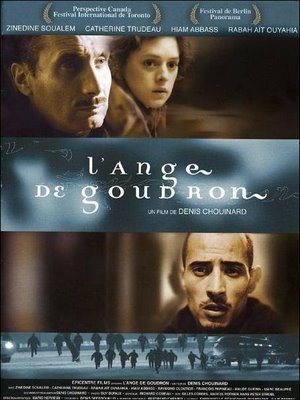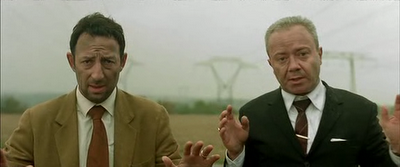
This is the first portugese movie that I've seen. And its certainly one of the best and finest I've seen in a very long time, probably the best in my collection. A movie achieves it's fullest impact on you especially when you see it without reading a single review, without seeing a single picture or screenshot of it, with no idea as to how the movie is going to turn out in the next 2.5 or so hours.. That's exactly the way I saw this film. Seeing the poster, i actually was under the impression that this is going to be a story centered on themes of love! I winced, yelled, became sober and winced again by the time I was through watching this movie.
Pandeyes42 from Australia writes:
It all starts with one of the most exhilarating and allegorical opening sequences is recent film history.A chicken caught between two opposing sides.One of those opening sequences,like Danny Boyle's "Trainspotting" (1996), that simply grabs the viewer by the throat and refuses to let them go until the film is done. One of the signs of a truly great film.
Thankfully, "City Of God" quickly proves itself to be equal substance and style. One of the aspects of this film that I love so much is the way that it is very raw,candid and intimate in the story that it tells. I have read that "City of God" has been compared to Martin Scorsese's "Goodfellas"(1990). I can see the comparison in the way that both films basically put you, the viewer,smack bang in the middle of the story they tell.Both films also have that sense of edge in that they are based on true events.
Spanning three decades, the story of "City Of God" covers many aspects of a very negative type of life, that of living in one of the most dangerous slums(favelas) in Brazil. What I found so compelling about the film is the way that it's main character, Rocket, searches for a way out of his supposed predestined fate. Before he discovers photography as a career, his choices are either policeman or criminal, both about as corrupt and venal as each other.
Although confronting and disturbing, "City of God" tells its story with a very down to earth attitude and, at times, a wonderful sense of humour, never more evident when Rocket tells us about his attempt at a life of crime.There is some beautiful writing throughout the film which really makes the viewer give a damn about its characters.
"City of God" is that rare film where the visual style fits the material perfectly. Watch the way that the optimism and innocence of the first part of the film, particularly the depiction of 'the tender trio', is contrasted against events after Lil Dice shows his true colours during the hotel robbery.
The use of a largely non-professional cast also absolutely rammed home this story for me. As a viewer, the worldly wise experience and attitude of a great deal of the cast really shone through. An absolutely gut wrenching moment that illustrates this perfectly would have to be Benny's going away party and its abrupt, shocking ending.To me, Benny was one of the more sympathetic characters in the film.For his life to be taken just as he was finding a way out of the 'ghetto thug life' hits the viewer right between the eyes. It is symbolic of the point of change within the story's framework. In "Goodfellas", Tommy's death was very similarly used.
Like one of my other films that I would say is one of the best of the decade so far, Darren Aronofsky's "Requiem For A Dream" (2000), "City of God" shows how its characters are attracted to something so negative such as gang life and criminal behaviour, while at the same time showing what happens when attraction turns into repulsion; the dream becomes a nightmare.
The clarity with which this is shown in both "Requiem" and "City of God" is something I admired greatly in both films. The ability of both filmmakers concerned to be impartial and non-judgemental in the subject matter at the cores of their respective films impressed me in both "Requiem" and "City of God".The subjects of both films, drug use and gang life respectively, are subjects that,via their films, make filmmakers either glamorize or preach in regards to how they depict their stories.One of the greatest strengths of this film is its absolute refusal to compromise or sugar coat its depiction of life in the slums.At the same time,I found "City of God" a very positive and hopeful film. The just about prefect final scene shows this. Rocket finally finding a way out of the slums and moving forward with his life, contrasted with the 'runts' planning their death list and how they're going to run the favela. This shows how one can achieve positive things in their life if they choose to do so, or take the easy option and follow what has gone before in their lives, even if it is a very negative thing to do.A very haunting and moving way to end a truly remarkable film.
As someone who loves cinema, I wish more films were this forceful and impassioned. Films like this remind me why I love cinema as much as I do.








